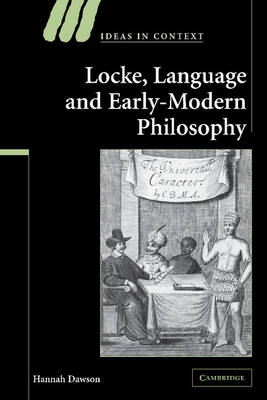
Locke, Language and Early-Modern Philosophy
Seiten
2011
Cambridge University Press (Verlag)
978-1-107-40302-4 (ISBN)
Cambridge University Press (Verlag)
978-1-107-40302-4 (ISBN)
Exploring the astonishing preoccupation with language in early-modern philosophy, and culminating in an analysis of Locke's critique of words, Hannah Dawson examines a broad sweep of pedagogical and philosophical material from antiquity to the late seventeenth century. The result is a powerful and original contribution to the history of ideas.
In a powerful and original contribution to the history of ideas, Hannah Dawson explores the intense preoccupation with language in early-modern philosophy, and presents an analysis of John Locke's critique of words. By examining a broad sweep of pedagogical and philosophical material from antiquity to the late seventeenth century, Dr Dawson explains why language caused anxiety in various writers. Locke, Language and Early-Modern Philosophy demonstrates that developments in philosophy, in conjunction with weaknesses in linguistic theory, resulted in serious concerns about the capacity of words to refer to the world, the stability of meaning, and the duplicitous power of words themselves. Dr Dawson shows that language so fixated all manner of early-modern authors because it was seen as an obstacle to both knowledge and society. She thereby uncovers a novel story about the problem of language in philosophy, and in the process reshapes our understanding of early-modern epistemology, morality and politics.
In a powerful and original contribution to the history of ideas, Hannah Dawson explores the intense preoccupation with language in early-modern philosophy, and presents an analysis of John Locke's critique of words. By examining a broad sweep of pedagogical and philosophical material from antiquity to the late seventeenth century, Dr Dawson explains why language caused anxiety in various writers. Locke, Language and Early-Modern Philosophy demonstrates that developments in philosophy, in conjunction with weaknesses in linguistic theory, resulted in serious concerns about the capacity of words to refer to the world, the stability of meaning, and the duplicitous power of words themselves. Dr Dawson shows that language so fixated all manner of early-modern authors because it was seen as an obstacle to both knowledge and society. She thereby uncovers a novel story about the problem of language in philosophy, and in the process reshapes our understanding of early-modern epistemology, morality and politics.
Acknowledgements; Notes on the text; Introduction; Part I. Language in the Trivium: 1. Language in logic; 2. Language in grammar; 3. Language in rhetoric; Part II. Philosophical Developments of the Problem of Language: 4. The relationships between language, mind and world; 5. Semantic instability: a containable threat; 6. Under cover of sensible and powerful words; Part III. Locke on Language: 7. Words signify ideas alone; 8. Semantic instability: an inherent imperfection; 9. A life of their own; 10. Locke in the face of language; Bibliographies.
| Erscheint lt. Verlag | 18.8.2011 |
|---|---|
| Reihe/Serie | Ideas in Context |
| Zusatzinfo | Worked examples or Exercises |
| Verlagsort | Cambridge |
| Sprache | englisch |
| Maße | 152 x 229 mm |
| Gewicht | 510 g |
| Themenwelt | Geisteswissenschaften ► Philosophie ► Sprachphilosophie |
| Sozialwissenschaften | |
| ISBN-10 | 1-107-40302-2 / 1107403022 |
| ISBN-13 | 978-1-107-40302-4 / 9781107403024 |
| Zustand | Neuware |
| Haben Sie eine Frage zum Produkt? |
Mehr entdecken
aus dem Bereich
aus dem Bereich
Macht und Legitimität politischer Sprache im Prozess der europäischen …
Buch | Softcover (2023)
Nomos (Verlag)
74,00 €
KI, Kreativität und algorithmische Postrationalität
Buch | Softcover (2024)
Matthes & Seitz Berlin (Verlag)
16,00 €
Wie die Menschheit zu ihrer größten Erfindung kam
Buch | Softcover (2022)
C.H.Beck (Verlag)
18,00 €


